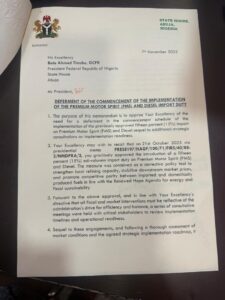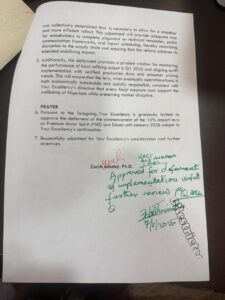
 Nigerian Coalition of Civil Society Organisations, NCCSO, has faulted the directive of the federal government’s deferment of the 15% import duty on premium motor spirit (PMS) and diesel to the first quarter of 2026 describing it as strategic move to strangulate local refineries and also victory for foreign fuel importers and their local collaborators.
Nigerian Coalition of Civil Society Organisations, NCCSO, has faulted the directive of the federal government’s deferment of the 15% import duty on premium motor spirit (PMS) and diesel to the first quarter of 2026 describing it as strategic move to strangulate local refineries and also victory for foreign fuel importers and their local collaborators.
NCCSO expressed this displeasure on Thursday in press statement issued in Abuja by its National Spokesperson, Comrade Mustapha Ahmed, saying the deferment to first quarter of 2026 must be wrong and should be totally discouraged, with no further extensions.
They said the government must resist pressures from international traders and uphold its commitment to energy independence, calling on all relevant agencies to monitor imports to prevent market distortion during the deferment period.
According to the coalition, “The deferment is a temporary win for importers but a setback for Nigeria’s refining future. President Bola Tinubu must remain resolute and protect Nigeria’s local industries from external manipulation”, NCCSO said.
The statement further reads: “The NCCSO expresses deep concern over the Federal Government’s decision to defer the commencement of the 15% ad-valorem import duty on Premium Motor Spirit (PMS) and Diesel to the first quarter of 2026, as contained in the memo approved by President Bola Ahmed Tinubu, GCFR, on November 7, 2025.
“While the decision is presented as an administrative adjustment for “technical alignment,” it is in fact a strategic victory for foreign fuel importers and their local collaborators, whose agenda is to keep Nigeria dependent on imported products and frustrate the growth of local refineries such as Dangote Refinery and other modular plants ready for operation.
“The Federal Inland Revenue Service (FIRS), led by Dr. Zacch Adedeji, Ph.D., had earlier proposed the levy to promote local refining, stabilize market prices, and ensure competitive balance — in line with the Renewed Hope Agenda. However, this deferment gives importers time to flood the market with imported fuel, thereby undermining local production and discouraging investment”.

